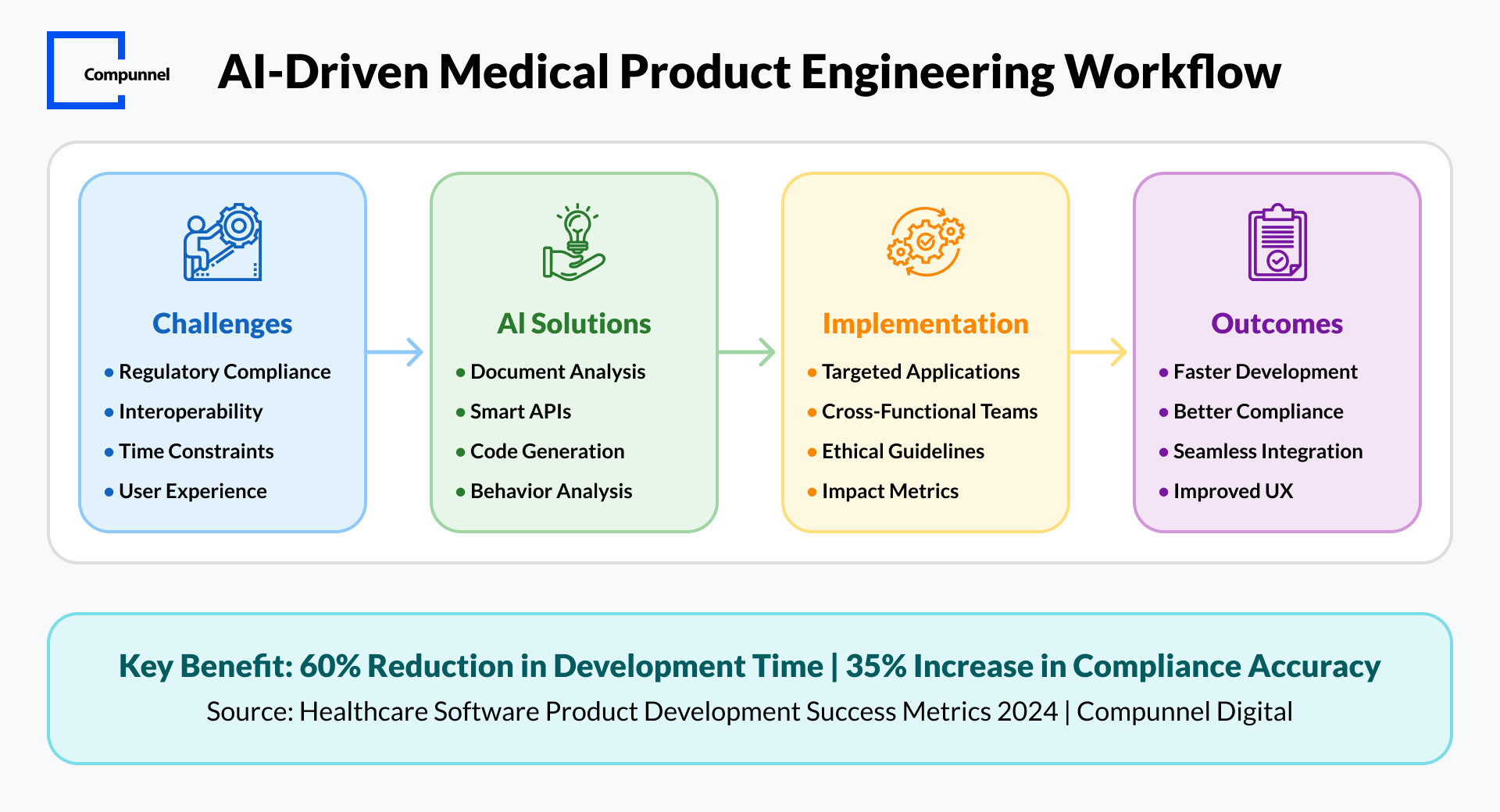Why AI Fails in Business: Key Gaps in Strategy and Governance
Introduction: Why AI Fails More Often Than Succeeds Artificial Intelligence (AI) has progressed from being experimental technology to being a…
In a world where healthcare is constantly changing, pioneering medical products must navigate a complex maze of regulatory requirements, technical hurdles, and expectations from demanding users. For software development companies looking to enter the healthcare market, this comes with its own unique hurdles that could delay launches and spikes costs, and ultimately affect patient outcomes. This is especially true when it comes to healthcare product engineering, where every step of the process must be executed with precision and regulatory compliance.
The introduction of artificial intelligence has been one of the most significant forces reshaping how the challenges mentioned above are approached. In this blog, we will address some of the most significant challenges in medical product engineering, and how AI-enabled solutions are transforming the paradigm of product development.
The healthcare industry is one of the most regulated industries for good reason. Products must meet strict FDA standards, HIPAA privacy laws, and several ISO requirements. For software developers, understanding regulations can be overwhelming, especially when laws change or are different in other countries. This is even more complicated for healthcare software product engineering, where compliance must be vetted throughout the lifecycle of the products.
Today’s healthcare systems are dependent on data exchange across various platforms and EHR systems. Creating product engineering integrate with the current systems while maintaining functionality and security offers substantial technical difficulties. Healthcare product engineering services can help offset these challenges by ensuring that medical products are designed with compatibility in mind from the outset.
Healthcare solutions are often a huge investment in research, development, and testing. To balance these requirements with the market’s demand for the newest solution to be available quickly creates pressure to streamline the development work; particularly without sacrificing quality or safety. Efficient product engineering services in healthcare, can ensure that time and budget constraints are accounted for, and result in optimal resource allocation.
The stakes are distinctly higher in the healthcare space, as a poor user experience could impact patient safety, not solely lead to frustrated users. Product teams must balance designing an interface that works for both clinicians and patients, in large part as both can easily have varying levels of technical proficiency, while also testing and making trade-offs on the design. AI healthcare product engineering approaches focus on designing user-friendly interfaces that increase safety for clinicians and patients through design simplicity and improve clinician and patient satisfaction as a result.
AI systems are transforming compliance from a manual, error-prone process to an automated, reliable workflow:
One healthcare software product engineering company implemented an AI compliance system that reduced regulatory review time by 60% while increasing detection of potential issues by 35%.
Artificial intelligence is breaking down interoperability barriers through:
Development efficiency improves dramatically with AI-driven approaches:
AI is revolutionizing how we create intuitive, effective user experiences:

Rather than attempting to transform your entire development process at once, identify specific pain points where AI can deliver immediate value. Regulatory document analysis, test automation, and user interaction modeling are often excellent starting points for AI-driven healthcare product engineering solutions.
Successful AI implementation requires collaboration between data scientists, domain experts, and engineering teams. Create opportunities for knowledge sharing and collaborative problem-solving across disciplines. By leveraging product engineering services in healthcare, teams can work together to overcome the complexities inherent in the industry.
In healthcare, ethical considerations are paramount. Develop clear guidelines for AI use that prioritize patient safety, data privacy, and algorithmic transparency, especially in sensitive healthcare product engineering contexts.
Track key metrics before and after AI implementation to quantify benefits and identify areas for refinement. Important metrics might include compliance issues detected, development cycle time, and user satisfaction scores. By focusing on tangible outcomes, AI-driven healthcare software product engineering efforts can be continually optimized.
The numbers don’t lie. Companies implementing AI-driven approaches to medical product engineering are seeing dramatic improvements:
The future of medical product engineering isn’t just about creating technology for healthcare—it’s about creating intelligent systems that learn and improve continuously. By embracing AI-driven approaches, your team can overcome traditional obstacles and focus on what matters most: innovation that advances patient care.
Are you encountering similar challenges on the journey to developing healthcare products? At Compunnel, we specialize in implementing solutions that integrate AI into medical product engineering, allowing you to transform regulatory obstacles into a streamlined process that enables innovation. With our deep understanding of the healthcare product engineering services, we ensure to deliver high quality-effective and scalable solutions to satisfy both regulatory and user needs.
Whether the challenge you face is regulatory compliance, interoperability, or creating designs that enhance user experience, Compunnel has the experience and technical solutions to help you navigate through these challenges. Our use of AI technology advances healthcare companies into dramatic improvements in efficiency, compliance accuracy, and user acceptance.
Don’t let technical and regulatory obstacles prevent you from moving forward on healthcare innovation. Reach out to Compunnel today about our healthcare product engineering and AI platform and we will help you develop better healthcare products faster, with less risk and better impact.
Explore our product engineering services and schedule a consultation with our healthcare AI team development specialists. Let us help you build the team that will shape the future of healthcare
